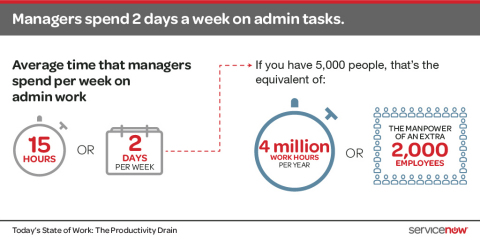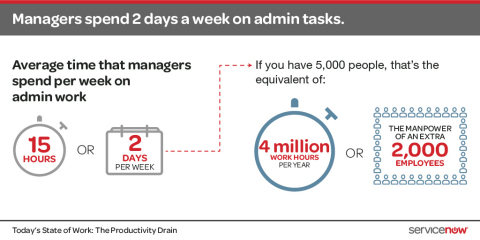LAS VEGAS--(BUSINESS WIRE)--KNOWLEDGE15—ServiceNow (NYSE:NOW), the enterprise cloud company, today released the results of a new report, “Today’s State of Work: The Productivity Drain,” revealing that managers in corporate environments spend nearly two days a week on unnecessary day-to-day administrative tasks that are not core to their jobs. This unleashes the possibility for exponential impact on an organization’s top and bottom lines as employees have less time to just do their jobs and it takes more people to get the work done.
ServiceNow surveyed nearly 1,000 managers in the United States and the United Kingdom to understand the effectiveness of the tools and processes in their corporate environment. The company asked them about how those tools and processes impact their individual and team effectiveness. The survey focused on four specific processes or services common in any corporate environment: setting up a new employee, opening a purchase order, requesting tech support and ordering marketing collateral. The results were consistent across all demographics.
Information workers spend as much time on unnecessary tasks as they do their jobs.
- 9 in 10 managers, regardless of company size or team function, spent time on administrative tasks outside their core job function.
- Those tasks include tasks such as providing status updates, filling out forms, requesting support and updating spreadsheets.
- On average, they spent more than 15 hours or 2 days a week on routine administrative tasks, with 20% spending 3 days or more.
- As a result, half of those surveyed said they did not have time for more strategic initiatives.
The tools used in the work environment are ill-suited for the tasks they need to complete.
- More than 80% of those surveyed rely primarily on inefficient, manual tools such as email, telephone calls and personal visits to get work done.
- Email was the top method used for opening a purchase order (53%) and onboarding a new employee (46%).
- Nearly half of the respondents agree that using email and spreadsheets for managing work reducing productivity at their companies.
- Fewer than 1 in 10 surveyed reported using automation to improve the efficiency of these repetitive tasks.
- Even larger organizations and more technology-aware functions like IT are still using the same manual tools.
“Email was never intended to run a company’s business processes,” said Dave Wright, ServiceNow chief strategy officer. “It is a communication vehicle that has been bastardized to fill a gap that exists in the systems permeated throughout the enterprise.”
The productivity drain is compounded by the complexity of business processes and the interdependencies between departments.
- More than 90% said the inefficiency of other departments directly impacts their individual and team productivity.
- On average, respondents reported having to deal with 4 different departments for the enterprise services common in almost every organization.
- More than 30% said 5 to 10 departments are typically involved in getting a new employee set up for their first day.
- More than 30% also said that it takes more than 10 individual interactions such as emails, phone calls or personal visits to make sure the company is ready for that new employee’s first day.
“While everyone agreed that productivity depends on how smoothly internal business processes run, the survey showed those processes are akin to a navigating a labyrinth,” said Wright. “Knowing when you have work to do, and being able to measure how effectively you perform that work, makes the whole organization more effective.”
The impact is exponential for entire organizations.
- In an organization with 5,000 managers, these unnecessary tasks and inefficient processes take up 4 million hours per year – that’s the equivalent of 2,000 full-time employees.
- Collectively across the United States, companies are spending $575 billion a year on these unnecessary tasks and inefficiencies.
- That equals 3.3% of the gross domestic product of the United States or approximately the combined annual profits of America’s 50 largest public companies.1
Workers feel they could be more productive if the technology in the office were more like the technologies they use at home and on the go.
- 75% of those surveyed agree that work processes and systems should work more like those they experience as consumers.
- They agreed that they want the simplicity and self-service control and transparency that they experience with popular online services they use in their personal lives.
- 9 in 10 surveyed said that automating these inefficient processes would make them more productive.
These issues can be overcome.
- Organizations can easily streamline and automate their internal business services today to get back this wasted time.
- If a company can whiteboard a process from request to approvals to fulfillment, they can build — and automate — practically any business process in HR, finance, IT, legal, marketing and more.
- Automation can help identify where time is being wasted and where processes can be improved.
- By adopting service management software and practices, organizations can replace emails, phone calls and spreadsheets with automated workflows that are as simple as the consumer services they use at home.
- The technology exists today and early adopters are showing the way forward.
- For more information, please visit our site.
“This survey points to the future of work that will leave behind this utter nonsense,” said Wright.
Survey Methodology
ServiceNow commissioned Lawless Research to design and conduct a study about the state of work in companies with 500 or more employees. Between March 10 and March 15, 2015, 915 managers who supervise at least one employee completed the 10-minute online survey (610 in the US and 305 in the UK). The online survey was hosted by Qualtrics and Survey Sampling International provided respondents from their online panel. The margin of error for the study is ±3.2 percentage points at the 95 percent level of confidence. Tests of significant difference were conducted at the .01 level (99% probability that the difference is real, not by chance).
Additional Resources
- Here’s the copy of the report, “Today’s State of Work: The Productivity Drain.”
- Here’s an infographic of these results.
- For more information on issues around email, see this blog post by Dave Wright, “Escaping the Endless Flow of Email to Get Real Work Done.”
About ServiceNow
ServiceNow is changing the way people work. With a service-orientation toward the activities, tasks and processes that make up day-to-day work life, we help the modern enterprise operate faster and be more scalable than ever before. Customers use our service model to define, structure and automate the flow of work, removing dependencies on email and spreadsheets to transform the delivery and management of services for the enterprise. ServiceNow provides service management for every department in the enterprise including IT, human resources, facilities, field service and more. We deliver a ‘lights-out, light-speed’ experience through our enterprise cloud – built to manage everything as a service. To find out how, visit www.servicenow.com.
ServiceNow and the ServiceNow logo are registered trademarks of ServiceNow. All other brand and product names are trademarks or registered trademarks of their respective holders.
1 This was calculated by the following. According to the Bureau of Labor Statistics, 2014 Occupational Outlook Handbook) the median salary for a manager is $88,885/year. The number of managers in US (Bureau of Labor Statistics, 2014 Labor Force Statistics) is 16,199,000. Multiplying 88,885 by 16,199,000 is $1,439,848,115,000/year. Forty percent of that is administrative work that equals $575,939,246,000/year. According to the GDP (Bureau of Economic Analysis, 2014 GDP) is $17.42 trillion. Dividing 17.42 trillion by 575,939,246,000 equals 3.3% of GDP.





